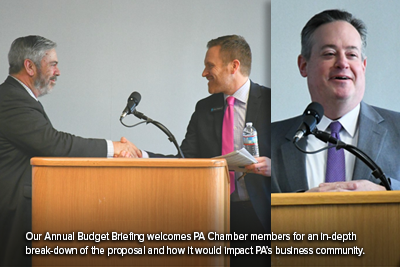February is a busy time in the state Capitol as lawmakers return to Harrisburg and budget conversations get underway. Even though the 2024-25 Fiscal Year does not begin until July 1, much needs to be negotiated between now and then – and it all kicked off with Gov. Josh Shapiro’s budget address.
 PA Chamber Investor Members convened at the PA Chamber headquarters to watch the governor’s budget address live and participate in our Government Affairs roundtable, where our top-notch Government Affairs team discussed the proposal and other key policy updates. The next day, PA Chamber members attended a Budget Briefing, where Budget Secretary Uri Monson and Revenue Secretary Pat Browne provided detailed analyses of the governor’s plan and answered questions about its impact on the business community. You can read more about these events here.
PA Chamber Investor Members convened at the PA Chamber headquarters to watch the governor’s budget address live and participate in our Government Affairs roundtable, where our top-notch Government Affairs team discussed the proposal and other key policy updates. The next day, PA Chamber members attended a Budget Briefing, where Budget Secretary Uri Monson and Revenue Secretary Pat Browne provided detailed analyses of the governor’s plan and answered questions about its impact on the business community. You can read more about these events here.
Budget Proposal Overview
In FY 2024-25, Gov. Shapiro wants to spend $48.3 billion – a 7.1 percent increase over last year, which would rely on more than $3 billion of the state’s “Rainy Day” fund. This is a concern for some lawmakers as Pennsylvania has a $1.3 billion structural deficit.
The proposal includes the continued, planned phase-down of Pennsylvania’s Corporate Net Income tax rate, which was reduced to 8.49 percent on January 1 and is scheduled to be reduced to 7.99 percent on January 1 of next year – but does not include other tax reforms.
The governor is also requesting $10.5 million in additional DEP funding to support staffing and speeding up the permitting processes for businesses, an additional $11 million for well-plugging, $2.5 million for 15 new positions in the Energy programs office, and $1.5 million to expand PFAS testing.
Total K-12 education spending would also increase over $1.5 billion, of which nearly $1.1 billion would go towards basic education. There would be no increase in the Education Improvement Tax Credit, or creation of any other student voucher program. In higher education, the Pennsylvania State System of Higher Education and community colleges would operate under a shared partnership, with a total increase of $127 million; and the Thaddeus Stevens College of Technology would receive a 15 percent, or $3 million, increase. The proposed funding for state-related universities would be $30 million (5 percent) and allocated through a new grant program (not the General Assembly). There are also proposed changes to how funding should be distributed to help students afford higher education.
In addition to a $2.4 million increase for career and technical education, the governor calls for an additional $2.2 million for industry partnerships, a $2 million increase for a new one-stop-shop career pathways site to ease the complications of job seeking, $2 million to aide businesses in implementing skills-based hiring, and a $2 million increase for foundations in industries to support internships at Pennsylvania companies.
The proposal includes several new funding initiatives related to the governor’s recently announced economic development plan. The largest proposal is $500 million for a newly created PA SITES Fund for site development and infrastructure to create shovel-ready sites. PA SITES would be funded by a $500 million bond issuance, which would be paid through a $15.4 million general fund appropriation, which annualizes to $45.2 million.
The governor’s proposal also creates a new $20 million PA Innovation line item to support entrepreneurs scaling their products, innovation, and research; creates a new $3.5 million Regional Economic Competitiveness Challenge to provide planning grants for regional growth strategies; increases funding for marketing to attract tourists by $15 million; and proposes eliminating the Keystone Communities program and replacing it with a new $25 million program called Main Street Matters.
As part of his budget plan, the governor has also proposed a minimum wage increase to $15/hour effective January 1, 2025. The proposal also calls for a $9/hour minimum wage for tipped workers, representing a 320 percent increase in labor costs for many restaurants.
The bottom line
The governor’s budget proposal is the first step in a months-long negotiation between the governor and the legislature, during which competing priorities will be debated until a final budget agreement is reached. The PA Chamber appreciates the governor starting this conversation with proposals to make Pennsylvania a more enticing place for businesses to locate, expand, and create jobs. As budget negotiations continue, we urge the governor and lawmakers to prioritize policies addressing areas where Pennsylvania is falling behind other states – specifically, our tax structure and regulatory processes – and improving workforce readiness.
“The reality is, having the reliable revenue to fund any new initiatives will be impossible in the long run if Pennsylvania continues to lose businesses, along with the jobs, economic activity, and tax revenue they generate,” PA Chamber President and CEO Luke Bernstein said in a statement following the governor’s budget address. But he ended on an optimistic note: “This year’s budget and legislative session present a critical opportunity to come together to improve Pennsylvania’s economic competitiveness, and we look forward to working with all stakeholders toward this important goal.”